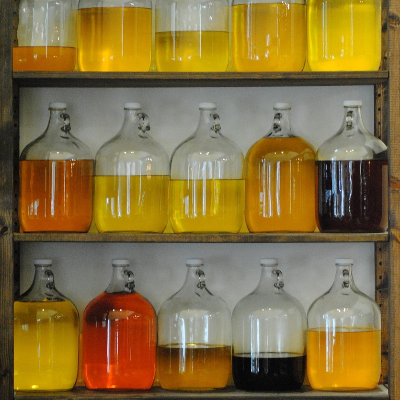Menu
-
-
F.A.Q
- How to identify genuine agarwood chip, natural or cultivated
- How to identify oil injection / absorption fake agarwood beads
- How to know if there are more than one oil in your oil
- How to make your wood bracelet or mala darker
- How to tell if an Agarwood bead sinks WITHOUT sinking it under water?
- How does back flow incense work and how do you burn it?
- Where to start if you don't know what agarwood is ?
- Why are you losing money if you buy seeds and plants?
- Which agarwood incense should I choose?
- Frequently Asked Questions
- Agarwood Related Articles
- Shipping
-
SHOP - Agarwood
-
SHOP - Other Fragrant Wood
-
SHOP - Incense Holder and Burner
-
- FREE Oud Oil guide
- Testimonials
- "Why did you buy this?"
- Contact us
- About Us
- +61430284329
- Login
-
English


People think the more expensive the Oud oil is, the better quality it is. Is this true?
August 14, 2020 7 min read
There are hundreds of different agarwood oils with different prices in the market.
The price of some oud oils is higher than others. Typically, the price range is from around $10 per gram to $50 per gram. This price range is an indication only as I have seen some oil costs $300 per gram.
Generally, some people believe that the expensive one will smell better. But is this belief true?
"It must be true," you say.
And maybe it is true.
Let's suppose it is true. Allow me to ask you one more question "the Y Oud oil costs five times more than the X Oud oil, does that mean it smells five times better?"
"Hard to say, huh?".
Let me share with you a story.
Fifteen years ago, when I was in a hospitality school, I discovered that when it came to taste and smell, people did not get it right all the time.
It was about a wine tasting lesson. In our class, there was one student named Ben, who was quite bright.
After the theory and some practical guides from the lecture, students will need to identify three red wines.
I did not know how Ben did it, but he was able to identify Shiraz, Cabernet Sauvignon and Merlo quickly in the first go.
I was inexperienced, and I got it ALL WRONG. I wondered how Ben got it right, so I asked him to share some tips.
Ben told me he could taste the differences.
"Does that mean his tongue is sensitive enough to pick up all the different tastes and his nose is so good that he can distinguish different aromas?" I thought to myself
If he were my lecture, I would believe him, and I would not question him. But this guy was around my age; I thought he could pinpoint the correct wine because he might have more experience than me, or simply he drank more than me. It would make sense if this were the case.
But he said he could taste the differences and I was not entirely convinced, so I decided to test him.
While he was showing other students how they could identify the differences between wines, I went to the back of the class and opened and poured a glass of Sauvignon Blanc (a white wine) at room temperature.
I grabbed that glass and added a few drops of red food colouring. The white wine turned red.
Bring this glass with me. I approached Ben and asked if he could identify what it was.
Ben took a sip; he told me it was Cab Sav (red wine) and asked me if he was correct. I nodded my head and said he was.
I lied because it would be a shame of him if I am revealing this information in front of many students. And it is not beneficial to anyone.
I wondered if I had asked him to close his eyes, would he have judged it differently?
It would be likely that he thought it was a glass of white wine. However, the red colour of the white wine might "deceive" him. It made him think it was red wine, although there was a difference in taste.
Lesson learn: visual influences taste and smell. Isn't that is why food and drinks seem to smell and taste better when they are packaged and displayed in fancy bottles and boxes?
Later on, during some of the class assignments, I also learnt that non-trained wine consumers did not derive more enjoyment from more expensive wine.
"Unless they are experts, individuals on average enjoy more expensive wines SLIGHTLY LESS" (Goldstein, et al 2008)
So let's get back to our oud price discussion.
What smell do you like?
Generally, people like sweet, floral and woody scent. These aromas are in oud oil.
When we were born, we did not like the bitterness. When we grow up, our parents taught us to smell the food before eating, especially the one left in the fridge. If it is off, discards them. From this experience, if something is pungent, we try to avoid it because this is our survival instinct. When the food smells "off", our brain tells us this is not safe to consume.
However, some people are internationally looking for "pungent note". They love it because they are used to it, and they know there is no harm but "pleasure" when smelling them.
Below is an example extracted from our LiveChat conversation
When you ferment something, it takes time and labour. It also takes more storage, and all these factors added up. Giving the same material, a well-fermented Oud oil can cost more than the non-fermented one.
From the above Live Chat example, the customer looks explicitly for "barnyard" smell which scares off many people.
And the particular oil he buys costs more than others.
So to him, it is an expensive one, and it smells better because he gets what he wants.
But
if someone who did not appreciate the fermented note, and he received this oil, he would be upset. The price of this oil is higher than other, but to him, it smells like "poop".
You see, the same oil but two opposite opinion.
One person thinks it is lovely, and intentionally look for it.
The other person hates it because of the fermented notes.
So It is all about what you are looking for and your background. The price may be essential, but not the main factor to consider.
What determines the price of oud oil?
The material origin.
I was born in Vietnam, and Vietnamese consumes rice daily as a staple food.
Imagine all rice are wild-harvested, and no one grows it. What is going to happen to supply and demand? And Ultimately, the price.
Similarly, if the agarwood is from a plantation, the price will be lower because they are more sustainable.
Wild agarwood will cost more.
The cost is higher because it is hard to get and is not entirely sustainable. To get these wood, the hunters need to look for them in the jungle. Sometimes, they get nothing from the trips, other times they get some good ones. What do you think the hunter would do when they found old resinous agarwood? That is right; they sell at a higher price.
The skill of the distillers
If an experienced distiller gets his hand on these wood, then he would be able to produce a "high-quality" oud oil.
And
With the same material, if another experienced distiller gets his hand on them, then he also would be able to produce another "high-quality" Oud oil.
Same agarwood material, each distiller will produce a different oil because it depends on how they "process" and "cook" the oil.
I also have seen in some rare instance; some distillers could not get any oil out of their agarwood.
Please note, although the same material used, distillers will produce a different final product because their pieces of equipment used are different. And their "cooking skill" is different.
The distribution channel or how you as a consumer order your oud oil
These distillers then either sell directly to their consumers or wholesale it to vendors. If you are as a customer, you could buy the same oil from two different "sellers" who get the stock from the same distiller. One price is higher than another, but the scent profile? Maybe the same
Put it this way.
The same Wagyu steak, different chefs with different styles of cooking, will produce different dishes. You are ordering these dishes at different restaurants, and each may charge different prices.
So you may ask yourself a question.
Is "high-quality" Oud oil of distiller A is better than "high-quality" of distiller B?
Not necessarily, and unfortunately, there will not be a definite answer to this question.
You, as the customer would be the judge.
You may prefer A over B, or you may prefer B over A
You could even like them both or
You don't like any of them, but a better-price oil from another vendor.
It is challenging to answer this question because your definition of "high quality" is different from other people.
Your definition of high quality is different than other people.
Two years ago, I was fortunate enough to sit down with a customer who has an extensive collection of oud and fragrance oil.
First, he picked a crystal bottle and asked me to try.
I opened the bottle, took a dab. I could tell this is an oud fragrance oil. I could detect sandalwood, musk, and patchouli. My impression: it was a very well blended perfume.
Then, he gave me another bottle. I found it herbaceous, medicinal and slightly smoky fragrance oil. It reminded me of an experience of visiting Traditional Chinese Medicine (TCM) with my mom. In my mind, I saw two TCM doctors cutting dried herbs. There were many herbs in the room, and the aroma was pleasant. I still remembered the smell vividly. I felt a connection to this bottle.
Because of my positive memory, this fragrance oil brought me; I prefer this over the first one. And I told him that.
Now here is the interesting part.
He told me the first one was aged for years and he bought it for $552 AUD for 5 ml from the USA. The second one was $212 AUD; he got in Malaysia from a private distiller.
Had he revealed me the price first, would it have affected my preferences? I don't know. Maybe it would.
But in this instant, since he told me the price after I experienced the scent, I believed I like a particular smell because I have a positive experience with it.
A slightly off-topic, I love aromatic herbs, so I love TCM herbs.
I ordered Gandhasasa from Kyarazen. I love how it smell at room temperature. And when I lit it up, it even smells better. My childhood memory is back.

How do you know if you like a particular agarwood oil without trying it?
Unfortunately, you don't unless you smell it.
Maybe you have not tried agarwood (oud) oil yet. But it would be likely you have tried one or many perfumes. The perfume description helps you to imagine how it smells. Sometimes, it is close to what you have in mind. But quite often, your actual experience would be different from what you read from the product description.
And just like how you evaluate a perfume, you will have a better idea of an oud oil by smelling it. The description helps, but the real smells will have your final decision.
The more oud oil you try them, you more chance you will discover which one you prefer over another, just like how you develop your aroma preference in perfume.
If you would like to learn more about how ould oils smell, then smelling them is an excellent way to learn. And there are many vendors you could buy from.
But since you are here, you would find below the link of a sample oud oil set that you could try.
Click here for the agarwood oil sample set.
Leave a comment
Comments will be approved before showing up.



